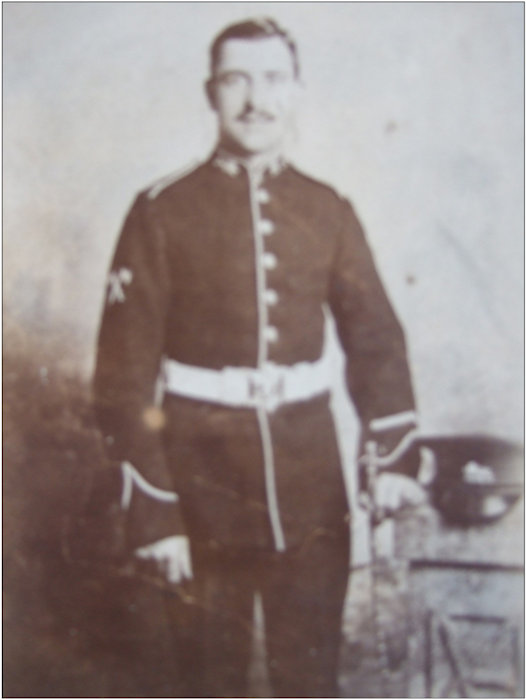By John Slaughter
This article was published in the August 2014 edition of Soul Search, the Journal of The Sole Society
At the Annual Gathering in October 2013 John Slaughter gave a talk about his grandfather Thomas Herbert Slaughter who had served in the 2nd Battalion of the Kings Own Royal Lancaster Regiment during the First World War. Thomas slaughter was a ‘regular’ soldier having joined the army in 1908 and had spent 2 years in India. In May 1915 the battalion was involved in the Battle of Frezenberg Ridge, part of the Second Battle of Ypres. Below is part of his talk which includes a description of the battle and appalling casualties suffered by the battalion.
The Second Battle of Ypres commenced with a German gas attack on the northern part of the salient against the trenches manned by French and Canadian troops. At that time the 28th Division were manning the trenches to the east around Zonnebeke. The gas attack on the 22nd April was the first time that gas had been used and the troops had no real defence. As a result the Germans made advances in the north and which had the effect of leaving the British very exposed on the east. As a consequence on 3rd May there was a general falling back in order to shorten the line and make it more defendable. As far as the 2nd Battalion Kings Own were concerned they retreated to the Frezenberg Ridge. New trenches were hastily dug but proved to be of little protection against the German shelling. The shelling intensified culminating in an intense bombardment on 8th May 1915. [Below is the] report made by the Major Commanding the Battalion (whose name isn’t given), which he wrote on 11th May 1915. Before doing so it is worth recording that in the War Diaries is a note stating the strength of the Battalion on 5th May 1915. At that date the Battalion consisted of 14 Officers and 949 other ranks, a total of 963.
“I have the honour to submit the following report on the attack on the FREZENBERG line of trenches held by the 2nd Battalion The Kings Own Regiment on Saturday 8th May 1915.
Two Companies D and A under Lieut Jebb and Captain Grover held those trenches north of the YPRES-ZONNEBEKE road and one platoon of C Company under Lieut Home held a section of trench on the south of the road, The 3rd Monmouth Regiment continued to line south. B Company and 3 platoons of C Company were in support occupying dugouts.
The enemy began to bombard the Fire Trenches between 7am and 8am and continued until about 10am destroying the parapets and rendering the trenches untenable. I am unable to definitely account for any NCOs and men from the Fire Trenches.
On the cessation of the bombardment the enemy seized the trenches and advanced to attack the support dugouts. At this juncture the O. C. 3rd Monmouths called for one Company to support his line and accordingly B Company under Captain Forwood at once moved forward and occupied some old earthworks on the east side of a burial ground in rear of the Monmouth trenches being unable to advance further.
About 10am the attack on the Battalion support trenches began, the enemy having advanced to within about 200 yards of them, where they were held in check. In the meantime considerable numbers of the enemy could be seen moving in a westerly direction on both flanks of the position.
Colonel Martin was killed very soon after the attack on the dugouts began and Captain & Adjutant Weatherhead was severely wounded in the head. Lieut Muchall was killed at an early stage of the attack. I assumed command of the Battalion. At this juncture the situation in front was favourable, the enemy making no attempt to advance. However on both flanks heavy rifle and machine gun fire was opened against my position. I however had comparatively few casualties.
At 11.35am I received the following message.
“O. C. Kings Own. Brigade Order just arrived in the form of a message from O.C. East Yorks to Adjutant who is now with us. Retire on POTIJZE and hold on at all costs. Signed W Ramsden, Captain & Adjutant 3rd Mons.”
I accordingly sent a message to the officer commanding B Company ordering him to retire and directing him to make the best of his way back to the POTIJZE line avoiding the main road. I then made arrangements to withdraw the 3 platoons I had directly under my orders. This was a most difficult operation and as I expected resulted in heavy casualties – only 40 NCOs and men succeeding in reaching the POTIJZE line with me.
Immediately I began to withdraw, the enemy rushed the position I had held, and opened a heavy rifle and machine gun fire from the position and on both my flanks their guns also opened fire with shrapnel and high explosive shells. Captain Weatherhead was killed by shrapnel when within a few yards of the POTIJZE line of trenches.
As far as can be ascertained the casualties amongst NCOs and men amounted to 922”.
The War Diaries confirm this level of casualties – on 9th May 1915 it is recorded that the total casualties of the Battalion between 4th May 1915 and 9th May 1915 were:
Killed 40
Wounded 115
Wounded and prisoners 2
Wounded and missing 32
Missing 725
Total 914
The question that this does not answer is was my grandfather at Frezenberg Ridge on 8th May 1915 and did he witness these horrific events. I have no way of knowing definitely if he was, whether he was one of the wounded or one of the few that got out unscathed (at least physically). All I can be certain of is that he was with the Battalion at the start and there at the end.
I have visited the Ypres area and seen Frezenberg Ridge. It does not look much like a ridge just an area of land slightly higher than the surrounding land. Just a few feet but often this could be crucial. However as far as the soldiers on Frezenberg Ridge on 8th May 1915 were concerned it provided no advantage at all.
John told the meeting that sadly his grandfather had spent the last 21 years of his life in the Hill End Hospital in St Albans mentally incapacitated. The family believed his mental problems were due to his experiences and that he had also been gassed.

